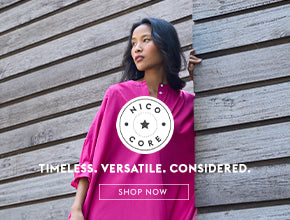Vogue
Though it’s only natural to try and find links between Nicobar and Good Earth, this new label distinguishes itself from 20‐year‐old retail behemoth by its free‐spirited lightness, in both aesthetic and ethos. “Indian consumers are changing and we felt it was time to address this change,” says Simran Lal, co‐founder, who built the Good Earth empire with her mother and creative director, Anita Lal. As she talks, her partners pour themselves coffee in the Nicobar conference room: an intimate, badminton court‐ facing office with hand‐drawn diagrams on the glass walls. Her husband and CEO, Raul Rai, a former private equity firm manager, shares that not a single tree was cut in making of these headquarters – a fitting metaphor for the brands organic emergence.
While Lal and Rai acknowledge Good Earth’s role in Nicobar’s provenance, they are careful to tell this story in a new light. “Unlike the princess Good Earth appeals to, Nicobar represents an Indian who is free from nostalgic reference,” says Lal describing the mood. Inspired by this shift, Nicobar does not rely on ornate Mughal reference but embraces Indian‐ness as an undercurrent. The result is a brand that places comfort above trend, and longevity over the temporary. “It’s a tropical mindset,” Lal explains, spelling out the nuances of warmth independence and freedom that are communicated by the name.
THE EASE OF EVERYTHING
The Nicobar range spans three segments: home, travel and fashion. Aparna Chandra, a NIFT graduate and stylist, was brought on as design head of the fashion line. Ease and comfort, she says, were key design motives inspiring everyday products that she would find in her own wardrobe and home. The result is a contemporary, love‐filled collection that comprises long cotton shirts that look soft from a mile away and carelessly chic dresses that could take a woman from beach to city. The designs though, steer clear of the minimal. “They are simple but not cold,” she says while pointing to a little embroidered bird nesting in the corner of a basic linen shirt.A conscious effort has been made to change how styling tips are communicated online: here, as consumers browse through apparel, personalised copy that cues cultural setting‐a linen dress worn to a museum café, for instance‐pups up, making buying and wearing the clothes an experience.
The mood seamlessly extends to Nicobar’s other two segments as well: in the happy range of home objects, voluptuous pineapple motifs are embossed on ceramic jars, and bright, lime‐hued teapots are found with coffee mugs that sweetly teach the Indian alphabet (R is for Raja‐Rani). Besides this optimistic sentiment, an explicit practicality also marks much of the design, especially in the travel accessories‐there are separate laundry bags for wet and dry clothes, for example. “Everything we do is about being personal and we don’t like to throw things away,” she explains showing us the high‐quality stitching on a backpack that makes this philosophy possible.
RIDING THE WAVE
The Nicobar expansion plan is based on democratising good aesthetics‐accessibility and affordability lie at the heart of the brand rather than youth or any other quantifiable demographic. “Sixty‐and 20‐year‐ old can both shop here,” Lal says. A lot of thought has gone into the pricing, with most of the products purchasable with cash people carry in wallets. While fair pricing is not consciously part of some large claim to ethics but rather a fortunate result of a simple supply chain, Lal explains that “doing the good thing” naturally translates to all the decisions they make: “I always ask whether something is toxic, or how long it will last, before making decisions,” she explains.Nicobar will open its first store in Mumbai’s hip Kala Ghoda area this month. In four years, they plan to open eight more‐ and host a series of pop‐ups‐ while embracing the online consumer who wants to create a nice home through the comfort of digital shopping.
“E‐commerce is the future, but we did not want to lose the touch‐and‐feel value of the store experience,” says Rai.
With its well thought‐out philosophy and plan for accessibility, Nicobar’s launch could well put an end to good taste as privilege. “We’re very excited,” Rai concludes, and jokingly declares his vision of someday becoming creative director, swapping roles with his wife. Chandra and Lal laugh in unison.
















 GET IN TOUCH
GET IN TOUCH